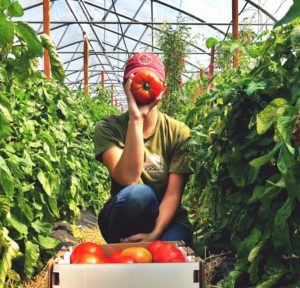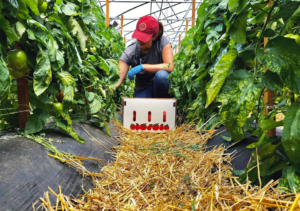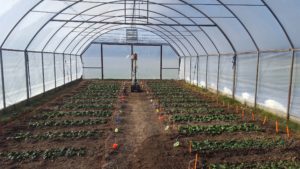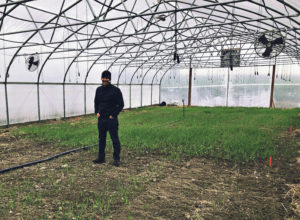High Tunnel Research Increases Profits for NY Growers

New York is a top 5 tomato tunnel state.
Caitlin Vore / CCE Cornell
According to the latest Census of Agriculture, there are nearly 8000 U.S. farms growing tomatoes in protected settings including greenhouses or high tunnels with a total value of $419 million.
How does New York rank?
- #2 in the U.S. for number of farms growing in protected settings with a total of 489 farms
- #3 in the U.S. for number of square feet under protection at 4,188,563 sq. ft.
- #4 in the U.S in value of sales at $28,590,555
To support this national ranking, the Cornell Vegetable Program continues to advance knowledge in high tunnel farming to achieve long-term profitability through sustainable soil and fertility practices. Over $100,000 in funding from a USDA Specialty Crop Block Grant, NNY Agricultural Development Program, Federal Capacity Funds and the Toward Sustainability Foundation support these efforts.

CCE Cornell Vegetable Program Aide Caitlin Vore harvests tomatoes with a cover crop trial.
CCE Cornell Vegetable Program
Under this funding the Cornell Vegetable Program is developing Best Management Practices for winter cover crops and nitrogen rates for cold climate high tunnels. Research includes trialing different species of cover crops suitable for high tunnel systems and optimizing the timing of planting and incorporation to maximize soil health benefits while minimizing the time spent out of vegetable production. We are also examining appropriate rates of nitrogen for winter high tunnel crops such as spinach. Early data from our research shows the promise of significant profits for farmers.
Nitrogen applications for overwintered tunnel greens varies widely farm-to-farm. Although the recommended nitrogen rate for field spinach is 100-125 lbs N/acre, anecdotally, we have heard reports of growers applying 200-600 lbs N/acre for high tunnel spinach. For our experiments, we used an unheated moveable 22 x 48 ft high tunnel with a single layer of plastic. Within the tunnel, we examined differences in spinach yield and foliar nutrients across two planting dates with four N fertility treatments, for a total of 8 treatment combinations. We applied nitrogen in rates of either 0, 65, 130, or 200 lbs N/ac.

High tunnel nitrogen research plots.
Judson Reid / CCE Cornell Vegetable Program
Overall, nitrogen rates did not significantly affect yield (Fig. 1). Control plots with no added nitrogen yielded as much spinach as plots treated with 200 lbs/acre N. This was consistent within both planting dates, and across harvest dates. Planting date did affect yield in the fall and winter, with the earlier planting producing significantly greater yields than spinach planted two weeks later. However, the later planting caught up to produce similar yields. If a grower is paying $20/lb of nitrogen, this could result in a savings of $4000/ac!
Initial take away for high tunnel growers:
- Soil and foliar test before making fertilization decisions.
- Winter greens may need dramatically less nitrogen.
- Planting date influenced our yields significantly; for winter greens plant early, well before October.
- High tunnel tomato growers can capture nitrogen with winter cover crops.

Judson Reid with a winter high tunnel cover crop trial.
Caitlin Vore / CCE Cornell Vegetable Program
Collaborators and contributors include Eastern NY Commercial Horticulture Program’s Elisabeth Hodgdon, farmers in 6 NYS counties, Cornell University Department of Horticulture’s Thomas Bjorkman, Cornell Willsboro Farm Manager Mike Davis, and Betsy Leonard, Organic Farm Coordinator at the Cornell Student Farm, Dilmun Hill. We gratefully acknowledge the contributions to this work of retired CCE educator Amy Ivy.

